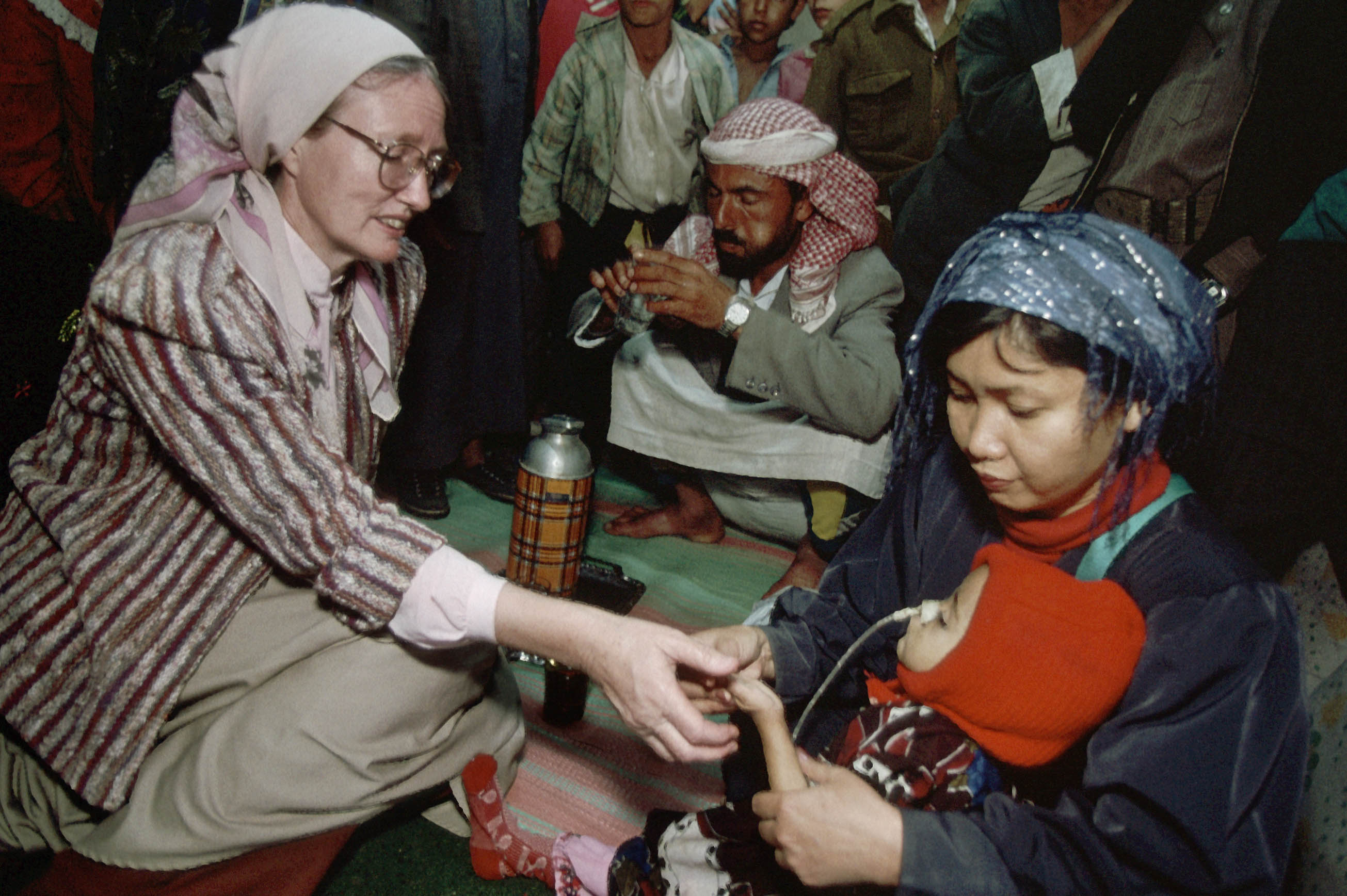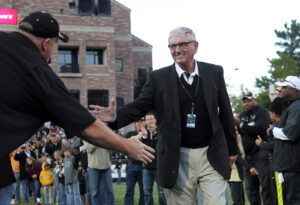
RICHMOND, Va. (BP)–Southern Baptist doctors Judy Williams and Bruce Roach used to have a friendly competition at Jibla Baptist Hospital in Yemen: Who would work the longest “shift” without walking out the front gate?
“I think the longest for me was three months,” recalls Williams, a surgeon who arrived in the isolated Arab nation in 1999.
“People would bring me food, and we had a commissary on the compound. I’ll be the first to admit I’m a workaholic, and my work was in the operating room. That’s where my friendships with Yemenis were made.”
Williams was one of the last in a long line of Southern Baptist workers who gave their skills, their hearts -– and in the case of three missionaries slain on the job, their lives -– to the hundreds of thousands of Yemenis who came to the hospital for care.
When Williams and several co-workers walked out the gate of the hospital compound for the last time this spring, their departure marked the end of four decades of fulltime Southern Baptist presence at the hospital, which was begun by missionary doctor Jim Young in 1967.
SECOND ENDING
Official involvement of Yemen Baptist Mission personnel at Jibla Hospital ended May 1. That date actually marked a second ending: The hospital passed from International Mission Board administration into Yemeni hands more than four years ago.
On Dec. 30, 2002, Southern Baptist workers were trying to complete a complicated transfer of the institution to Yemeni control when physician Martha Myers, hospital administrator Bill Koehn and purchasing manager Kathy Gariety were shot by a Muslim militant who burst into Koehn’s office. Myers died on the spot. Williams and other hospital workers tried to save Koehn and Gariety, but their point-blank gunshot wounds were fatal. A Southern Baptist pharmacist also was shot and seriously wounded in the attack, but later recovered.
Jibla reopened in early 2003 under Yemeni administration. Several Southern Baptist workers, including Williams, continued to serve on the staff, providing critical management and medical support. Late last year, the eight remaining Baptist workers (seven Southern Baptists and a Mexican Baptist doctor) decided the time had come to end fulltime involvement at the hospital.
“We completed what we set out to do,” Williams said of the decision. “From a medical perspective, the hospital had been transitioned to the Yemeni government and was treating more patients than it ever had -– with minimal input from Yemen Baptist Mission personnel. Regarding matters of the heart, they too were progressing. In many ways, our presence in Jibla was hindering growth.
“If we hadn’t completed our work, the rest of the team would still be living on the compound in Jibla, continuing to work in what can be a very difficult and yet rewarding field of service -– both medically and spiritually.”
Yemen Baptist Mission workers will continue involvement in several ministries begun at the hospital, including aid to needy widows, orphans and migrant Bedouin camps in the area. One Baptist physician still works in the hospital’s outpatient clinic twice a month. Workers also hope to continue partnering with the hospital in medical education and life-saving community immunization programs in Yemen’s countryside.
In a letter to veterans and supporters of the hospital, Williams said: “We do not see this as a sign of failure, but rather as a sign of growth. That does not mean it will be easy or without a sense of loss and grieving. I know from previous experiences that this process may actually be easier for those of us physically here than for you from afar.”
Only the dedicated band of missionaries, workers and volunteers who served at Jibla can understand the depth of those words.
40 YEARS ON THE FRONT LINE
Over the past 40 years, they endured extended civil war in Yemen, a disastrous fire, numerous financial crises, ongoing personnel shortages, political pressures, legal battles that threatened to shut down the hospital, kidnappings -– and the murder of three of their own.
And always, they faced the daily challenge of treating –- and loving -– the endless stream of patients who came to the little hospital from all over the impoverished Middle Eastern nation of more than 19 million people.
At its peak, the 77-bed mission hospital employed several hundred workers, treated some 40,000 people a year, performed more than 400 surgeries a month and operated a busy outpatient clinic. For a time it offered a weekly chapel that was the only public Christian worship service in the conservative Muslim nation.
Patients included everyone from villagers who had never laid eyes on a doctor to powerful sheiks and government officials. They knew Jibla offered some of the best -– and most compassionate -– medical care in Yemen.
“So many times I thought, ‘I can’t do anything else,’ and yet they just kept coming and coming,” remembers missionary nurse Kelly Hawkins*. “We struggled with the work setting, the intensity and just the length of hours we had to put in while trying to care for our young family.”
Hawkins and her husband, Doug*, also a nurse, directed nursing and ancillary services, ran the operating room and filled many other roles during their 15 years at the hospital. Doug served as interim hospital administrator several times when his close friend Koehn was on home assignment in the United States. Today, they help coordinate Southern Baptist work throughout Northern Africa and the Middle East.
Often, they treated entire families in the hospital’s renowned burn unit. They once cared for nine members of a single family who had suffered terrible burns in an accident.
“Just to take pressure off our other nurses, Kelly and I would go in every day and change their dressings,” Doug says. “You’re stripping off dead skin, so they would holler the whole time, just scream in pain. Those are the days that were tough.”
One frantic night during Ramadan, the annual Muslim period of fasting and repentance, most local hospital workers were at home with their families. Many foreign medical workers were temporarily out of the country because of tensions related to the first Persian Gulf War. The Hawkinses found themselves covering virtually the entire hospital. Kelly was the only nurse on the women’s ward with 37 patients -– not counting the 10-bed maternity ward. Her only scheduled Yemeni helper didn’t arrive at work.
“Kelly had nine patients in the delivery room and four or five of them were in active labor,” Doug recalls. “Our 11-year-old daughter came to help. Kelly delivered premature twins, and both were in respiratory difficulty. This little 11-year-old girl sat there for an hour resuscitating those babies, helping them breathe with oxygen. One of them died, but she just kept going.”
Both of the Hawkinses’ daughters are medical professionals today. Jibla had a way of getting everybody involved.
FAITHFUL ‘PLODDERS’
“This hospital played a very important part in maturing missionaries, young and old,” Kelly says. “Many of us came to Jibla young, and we were mentored well. We learned a lot of hard lessons. I think God knew the type of people He needed in Jibla were ‘plodder’ types -– not many shining stars, but people who were consistent and who would stay the course through the long haul.”
The ultimate “plodder” at Jibla was Bill Koehn, the low-key former grocery store manager from Kansas who led the hospital as administrator for 28 years. He was quiet, predictable, an old-school manager who operated on a strict daily schedule.
Koehn’s highly structured style enabled him to handle the countless details involved in running the hospital -– and deal with the countless crises that threatened it. Yet he somehow had the time to make wooden toys for the orphanage he loved to visit, to assist needy widows in the community, to drink tea with Yemenis and listen to their struggles and needs.
After his death, Koehn’s wife Marty returned to serve at Jibla. She also petitioned the president of Yemen to spare the life of her husband’s convicted killer, Abed Abdul Razak Kamel (Kamel was executed last year). She came back to the United States in January to retire from missionary service.
Martha Myers, the polar opposite of Koehn, could not have been more different in personality and work style during her 20-plus years at Jibla.
A talented surgeon and a free spirit, Myers had a motto: “Things don’t matter, people do.” For her, “things” included not only possessions but rules and schedules, which drove some of her medical colleagues to distraction -– but endeared her to her many Yemeni friends.
Myers alternated marathon days and nights treating patients at the hospital with unscheduled “house calls” -– extended excursions into far-flung mountain villages to visit and care for Yemeni families, many of whom could not reach the hospital. She also pioneered several new types of surgery to help Yemeni women and led far-reaching immunization efforts in the region.
As different as they were, Koehn and Myers shared a deep love for Christ and for the people of Yemen. Today they share side-by-side graves atop a hill on the hospital compound.
‘THE BEST SHE HAD’
A Yemeni man befriended by hospital workers once explained to Doug Hawkins what attracted him to the place.
“I remember him saying it was the people at the hospital taking time to stop and listen,” Doug relates. “That was something that Martha and Bill embodied in their ministry -– treating patients with dignity, making them see that they were somebody. Jibla couldn’t treat everybody, but she gave the best she had, no matter how much time it took.”
Asked to describe the legacy of the hospital, one Southern Baptist worker paused before offering a single word: perseverance. “Against all the odds,” he said, “we persevered.”
Martha Myers, reflecting on a similar question a few years before her death, put it this way: “I think the presence of the hospital is making an impact. Only eternity will really know what the impact is.”
One day, eternity will tell.
–30–
*Names changed for security reasons. To order “Lives Given, not Taken,” a book about Myers, Koehn, Gariety and other modern missionary martyrs, visit imbresources.org/index.cfm/fa/store.prod/ProdID/1330.cfm.













